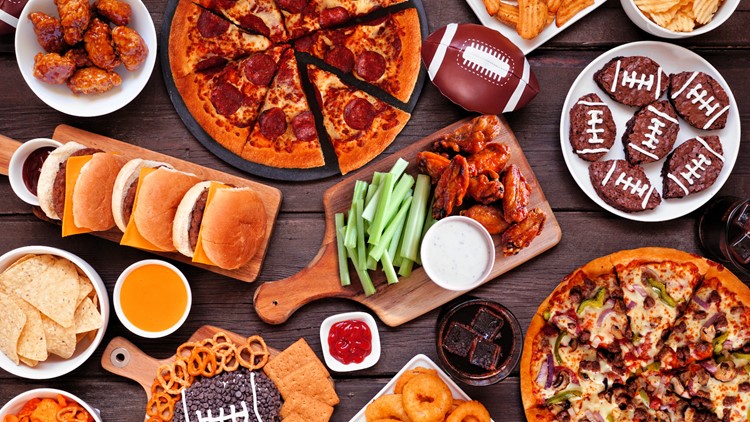Super Bowl LVIII kicks off on Sunday, Feb. 11 at Allegiant Stadium in Las Vegas, where the Kansas City Chiefs will take on the San Francisco 49ers.
Many Americans enjoy the big game by cheering on their favorite teams, watching the halftime show and snacking their way through it. In fact, the USDA says Super Bowl Sunday is the second-largest food event of the year, after Thanksgiving.
The Super Bowl is typically around four hours long. During that time, many perishable foods, like chicken wings and pizza, may get left out a bit too long, according to food safety experts.
Here are five Super Bowl food safety tips to keep you and your party safe on game day.
THE SOURCES
WHAT WE FOUND
On Super Bowl Sunday, millions of Americans either prepare a massive spread of their favorite game-day foods at home or order takeout.
No matter if you decide to cook or have your wings delivered, these five food safety dos and don’ts will help you safely make it through the big game without ending up with an upset stomach.
DO: Wash hands and surfaces often
The USDA, CDC and FDA all agree that you should wash your hands with soap and running water for at least 20 seconds before, during and after preparing food on Super Bowl Sunday. You should also wash your hands before eating, after you use the bathroom and if you have touched any pets at the party.
“Clean hands, surfaces and utensils with soap and warm water before cooking and after contact with raw meat and poultry,” the USDA says on its website. “After cleaning surfaces that raw meat and poultry have touched, apply a commercial or homemade sanitizing solution.”
In addition to washing your hands, you should make sure your cutting boards, dishes, utensils and countertops are cleaned with hot, soapy water after preparing each food item. The CDC also recommends washing or scrubbing fresh fruits and vegetables under running water, so that dirt and germs on the surface don’t get inside when they’re cut.
DO: Separate to avoid cross-contamination
It’s important to use separate cutting boards, plates and utensils to avoid cross-contamination between raw meat or poultry and foods that are ready to eat, according to the USDA, CDC and FDA.
“Separate raw meats from ready-to-eat foods like vegetables when preparing, serving, or storing foods. Use separate cutting boards, plates, and knives for produce and for raw meat, chicken and other poultry, seafood, and eggs,” the CDC says.
Hot and cold foods should also be kept separate to avoid cross-contamination during your Super Bowl party, USDA food safety expert Meredith Carothers told VERIFY.
“If you're like making chicken wings, and you're getting a sauce all on them, but you've also just received pizzas that have been delivered, you want to try and make sure that those are on separate counters or away from each other, so there's no potential of that cross-contamination,” Carothers said.
DO: Cook food to the right temperature
The USDA recommends using a food thermometer to confirm whether hot and cold foods are cooked to a safe internal temperature on game day. That’s because cooking food to the right temperature kills harmful germs, according to the CDC.
Hot foods should be kept at an internal temperature of 140°F or warmer, depending on the dish. Cold foods should be kept at 40°F or colder.
If chicken wings are on the menu, the USDA says you should use a food thermometer on several of the wings to gauge whether the entire batch is done. If one wing is under 165°F, you should continue cooking all the wings until they reach that safe internal temperature. The USDA shares a safe minimum internal temperature chart for other foods on its website.
To make sure your hot food keeps the safest internal temperature throughout Super Bowl Sunday, you can keep it heated in chafing dishes, slow cookers and warming trays.
DON’T: Leave food at room temperature for longer than two hours
It’s not safe to leave perishable foods, like chicken wings, deli wraps and meatballs, at room temperature for longer than two hours. Bacteria multiply rapidly between 40°F and 140°F, according to the USDA, which is why this temperature range is called the “Danger Zone.”
That’s why you should refrigerate or freeze foods promptly if you don’t plan on eating them immediately after cooking. If hot or cold foods have been left out for more than two hours, or more than one hour if they have been exposed to temperatures above 90°F, you should throw them away.
Nonperishables, like nuts and chips, are the only foods that can safely be left out for hours, Carothers said.
DON’T: Double dip at large gatherings
Double dipping is not safe, especially at a large gathering like a Super Bowl party, according to Carothers. That’s because double dipping could spread germs and bacteria between guests, and even cross-contamination.
“If people have allergies, you have to consider that. Say you double dipped into something else after you dipped into peanut butter, then you're dipping into something else or the ranch, that's potentially a cross-contamination factor for somebody who has allergies or other food and dietary restriction,” Carothers said.
The CDC recommends offering your guests individual serving utensils and small plates to discourage them from double dipping on Super Bowl Sunday.



